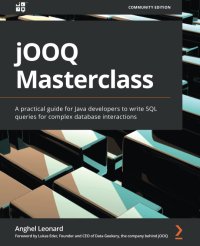
Ebook: jOOQ Masterclass: A practical guide for Java developers to write SQL queries for complex database interactions
Author: Anghel Leonard
- Year: 2022
- Publisher: Packt Publishing
- Language: English
- epub
Learn the best way to write SQL in Java by taking control of SQL in your app via a type-safe, dynamic and versatile API that supports almost any type or feature compatible with a database and emphasizes SQL syntax correctness
Key Features
- Write complex, type-safe, and dynamic SQL using the powerful jOOQ API
- Tackle complex persistence tasks, such as lazy fetching, R2DBC, transactions, and batching while sustaining high traffic in your modern Java applications
- Use a comprehensive SPI to shape and extend jOOQ according to your needs
Book Description
jOOQ is an excellent query builder framework that allows you to emulate database-specific SQL statements using a fluent, intuitive, and flexible DSL API. jOOQ is fully capable of handling the most complex SQL in more than 30 different database dialects.
jOOQ Masterclass covers jOOQ from beginner to expert level using examples (for MySQL, PostgreSQL, SQL Server, and Oracle) that show you how jOOQ is a mature and complete solution for implementing the persistence layer. You'll learn how to use jOOQ in Spring Boot apps as a replacement for SpringTemplate and Spring Data JPA. Next, you'll unleash jOOQ type-safe queries and CRUD operations via jOOQ's records, converters, bindings, types, mappers, multi-tenancy, logging, and testing. Later, the book shows you how to use jOOQ to exploit powerful SQL features such as UDTs, embeddable types, embedded keys, and more. As you progress, you'll cover trending topics such as identifiers, batching, lazy loading, pagination, and HTTP long conversations. For implementation purposes, the jOOQ examples explained in this book are written in the Spring Boot context for Maven/Gradle against MySQL, Postgres, SQL Server, and Oracle.
By the end of this book, you'll be a jOOQ power user capable of integrating jOOQ in the most modern and sophisticated apps including enterprise apps, microservices, and so on.
What you will learn
- Enable the jOOQ Code Generator in any combination of Java and Kotlin, Maven and Gradle
- Generate jOOQ artifacts directly from database schema, or without touching the real database
- Use jOOQ DSL to write and execute a wide range of queries for different databases
- Understand jOOQ type-safe queries, CRUD operations, converters, bindings, and mappers
- Implement advanced SQL concepts such as stored procedures, derived tables, CTEs, window functions, and database views
- Implement jOOQ multi-tenancy, tuning, jOOQ SPI, logging, and testing
Who this book is for
This book is for Java developers who write applications that interact with databases via SQL. No prior experience with jOOQ is assumed.
Table of Contents
- Starting jOOQ and Spring Boot
- Customizing the jOOQ Level of Involvement
- jOOQ Core Concepts
- Building a DAO Layer (Evolving the Generated DAO Layer)
- Tackling Different Kinds of SELECT, INSERT, UPDATE, DELETE, and MERGE Statements.
- Tackling Different Kinds of JOIN Statements
- Types, Converters, and Binding
- Fetching and Mapping
- CRUD, Transactions, and Locking
- Exporting, Batching, Bulking, and Loading
- jOOQ Keys
- Pagination and Dynamic Queries
- Exploiting SQL Functions
- Derived Tables, CTEs, and Views
- Calling and Creating Stored Functions and Procedures
- Tackling Aliases and SQL Templating
- Multitenancy in jOOQ
- jOOQ SPI (Providers and Listeners)
- Logging and Testing